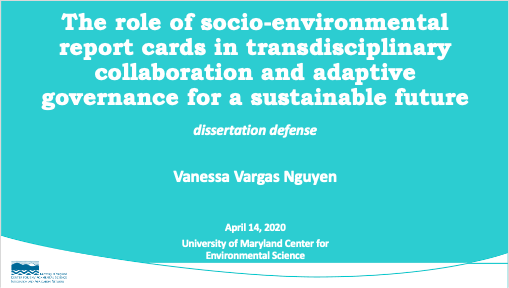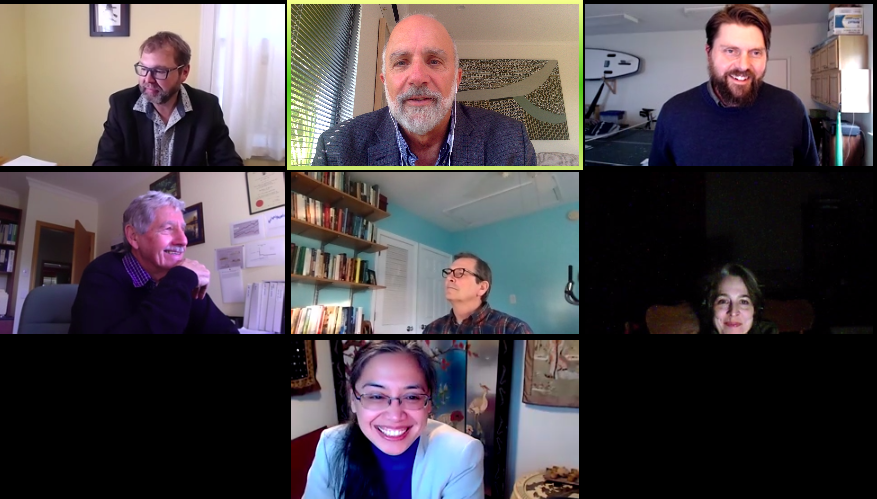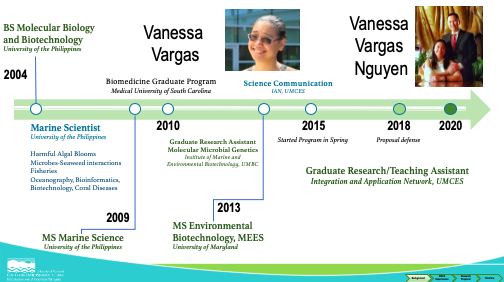Dr. Vanessa Vargas-Nguyen successfully defends her dissertation
Bill Dennison ·
On 14 April 2020, Vanessa Vargas-Nguyen defended her dissertation over Zoom, the first remote dissertation defense for the Marine Environmental Estuarine Science (MEES) Program. All previous dissertation defenses for the 40+ year history of the MEES program had been done in person. The COVID-19 situation precluded an in-person defense, hence the switch to Zoom. But there were several advantages to having a remote defense, namely 1) the public audience could attend from around the world, 2) scientists from the multi-institutional MEES program throughout the state of Maryland could attend, and 3) we were able to record the seminar for further reference and for those unable to attend in real time.
The defense was held at 3 pm Maryland time to accommodate two of Vanessa's committee members who were located in Australia (Drs. Bill Dennison; Queensland and Barry Hart; Victoria) which was 5 am for them and one committee member located in Europe (Dr. Christina Prell; Netherlands) which was 9 pm for her. Vanessa's other committee members were in Maryland (Drs. Michael Paolisso, Heath Kelsey and Andrew Elmore).

The title of Vanessa's dissertation was the following: "The role of social-environmental report cards in transdisciplinary collaboration and adaptive governance for a sustainable future". She used a combination of natural and social science tools and had two case study locations: Chesapeake Bay and the Mississippi River. There are four main chapters in the dissertation, and the first of them was published in a peer review journal earlier this year (Vargas-Nguyen et al., 2020). We will be looking forward to the next three chapters being published in the near future.
The major theme and substantive advancement that Vanessa articulated in her dissertation was the transition from strictly ecological report cards to more comprehensive and integrated socio-environmental report cards. In making this transition, Vanessa has been a thought leader for the Integration and Application Network (IAN) team. She has embraced a suite of social science tools to advance this transition, including social network analysis and cultural consensus modeling.
Vanessa had some sensational graphics to support her dissertation, including a conceptual diagram of a new three phase framework for producing socio-environmental report cards and a conceptual diagram of a future vision for Chesapeake Bay, its watershed and the human communities in the watershed. In addition, she created beautiful diagrams for environmental intelligence pyramids for the Chesapeake Bay and the Mississippi River which are fantastic.
Vanessa will receive the first PhD awarded under the recently created 'Environment & Society' foundation in the MEES program. Vanessa was an exemplary graduate student. She served as the Teaching Assistant for the inaugural foundation course for the Environment & Society foundation. Vanessa was a member of a graduate student team pursuit at the National Socio-Environmental Synthesis Center (SESYNC). Vanessa enrolled in three Issue Study Groups, producing an Upper Potomac Headwaters Report Card 2015, a peer review paper about Chesapeake Bay hypoxia (Testa et al., 2017) and a manuscript about transdisciplinary science (Douglas et al., in prep.). Vanessa also helped organize the 2015 MEES Colloquium, hosted by IAN in Annapolis.
A major impetus for Vanessa to finish her dissertation was so that she can assume the role of Project Coordinator for a newly established transnational, transdisciplinary project, 'Coastal Ocean Assessment for Sustainability and Transformation (COAST Card)'. This project is funded by the Belmont Forum, an international consortium of funding agencies.

Following the public seminar, including a question and answer session, Vanessa met with her committee for a couple of hours to discuss her dissertation. The committee gave her glowing remarks and asked for a suite of edits and additional material for her dissertation before it is submitted. After this somewhat grueling process, Vanessa joined the IAN team in a virtual celebration where we insisted that she change her name under her image to "Dr. Vanessa".
Vanessa's milestone is a major accomplishment for the IAN team, as well as for the Environment & Society foundation of the MEES program. We can all be proud of her accomplishment and wish her success in the next phase of her career.

References
Testa, Jeremy M., J. Blake Clark, William C. Dennison, E. Caroline Donovan, Alexander W. Fisher, Wenfei Ni, Matthew Parker, Donald Scavia, Suzanne E. Spitzer, Anthony M. Waldrop, Vanessa M.D. Vargas, Gregory Ziegler. 2017. Ecological forecasting and the science of hypoxia in Chesapeake Bay. Bioscience 67: 614-626.
Vargas-Nguyen, Vanessa, R. Heath Kelsey, Harald Jordahl, William Nuttle, Charles Somerville, Jane Thomas, and William C. Dennison. 2020.Using socio-environmental report cards as a tool for transdisciplinary collaboration. Integrated Environmental Assessment and Management 2020: 1-14.
About the author
Bill Dennison

Dr. Bill Dennison is a Professor of Marine Science and Vice President for Science Application at the University of Maryland Center for Environmental Science.

